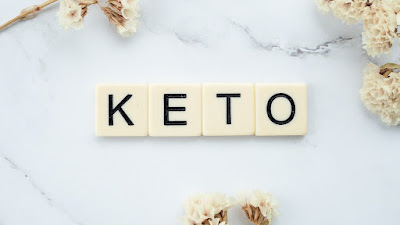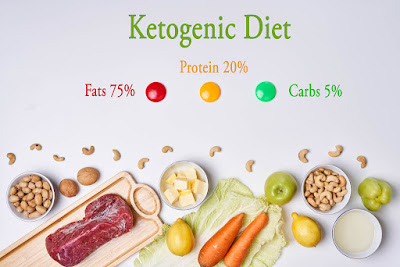Deep study about Ketosis and ketogenic diet affects :
Ketosis is a state of pure metabolism.
It comprises the body generating ketone bodies from fats and using them as a source of energy rather than carbs. Following a ketogenic diet that is extremely low in carbs and high in fats will put you in ketosis.
A ketogenic diet also aid weight loss. Because it reduces the body's glycogen and water stores, you'll be able to lose weight quickly in a short amount of time.
Ketosis may, in the long-term, suppress your desire for eating, resulting in lower calorie consumption.
Ketosis may have a lot of health benefits in addition to weight loss, such as fewer seizures in children with epilepsy.
Ketosis is a bit of a mystery, but this article explains what it is and how it might help you.
What is ketosis?
Ketosis is a metabolic state in which the blood contains an excessive amount of ketones. When lipids provide a lot of fuel for the body and glucose access is restricted, this happens. Glucose (blood sugar) is a common source of energy for many cells in the body.
Ketosis is most commonly associated with ketogenic and relatively low carbohydrate diets. It can also happen during pregnancy, childhood, fasting, and hunger.
To enter Ketosis, you must consume fewer than 50 grammes of carbs per day, and generally as few as 20 grammes. However, the amount of carbs required to enter ketosis differs from person to person.
To do this in Ketosis , you may need to exclude certain food items from your diet, such as:
- legumes
- sweet
- sugary comfortable drinks
- sweet and cosy beverages
You may also need to exclude:
- potatos
- fruits
When you eat a very low carbohydrate diet, your hormone levels decrease, and you release a lot of fatty acids from your body fat stores.
Many of those fatty acids are carried to the liver, where they are oxidised and converted to ketones . These molecules have the ability to provide energy to the body.
Ketosis, unlike fatty acids, can pass the blood-brain barrier and can provide energy to the brain in the absence of glucose.
Ketones have the power to give your brain energy.
It's a common misconception that the brain can't function without carbs in the diet.
It's correct that glucose is the most popular source of energy, and that some brain cells can only run on glucose.
However, a big part of your brain can also use ketones for energy, such as when you're hungry or your diet is low in carbs.
One fact is that ketones provide 25% of the brain's power after only three days of hunger. This number jumps to around 60% in cases of long-term hunger.
Furthermore, your body can use protein or other substances to provide the glucose that your brain still demands when in ketosis. Gluconeogenesis is the name for this process.
What is the difference between ketosis and ketoacidosis?
Ketosis and ketoacidosis are frequently confused.
While ketosis is a normal element of metabolism, ketoacidosis is a dangerous metabolic condition that can be fatal if not treated.
The bloodstream is filled with extremely high levels of glucose (blood sugar) and ketones in ketoacidosis.
The blood becomes acidic as a result of this, which is quite harmful.
Uncontrolled type 1 diabetes is the most common cause of ketoacidosis. It can also happen to people who have type 2 diabetes, however this is far less common.
Ketoacidosis can also be caused by excessive alcohol use.
Ketosis Results on weight loss :
The ketogenic diet is a popular weight-loss plan that has been demonstrated to be effective in a lot of studies.
According to several research, ketogenic diets are more effective for weight loss than low-fat diets.
In one study, people who followed a ketogenic diet lost 2.2 times more weight than those who followed a low-fat, calorie-restricted diet.
Furthermore, on a ketogenic diet, people tend to feel less hungry and more full, which is attributable to ketosis. As a result, calorie counting is usually not necessary on this diet.
Nonetheless, it's common knowledge that sticking to a diet is critical for long-term success. Some people may find the ketogenic diet simple to follow, while others may find it difficult to maintain.
According to some research, the keto diet is unlikely to be one of the most effective strategies to lose weight. According to the authors of a 2019 study, it was no better than other diets at helping people lose weight, and it didn't appear to have any special benefits for people with metabolic disorder.
What is Ketosis health benefits?
Some scientists have suggested that the ketogenic diet and the keto diet provide additional therapeutic benefits, although it's worth noting that not all experts agree on this.
- Ketosis health benefits in Heart disease: Some earlier research suggests that decreasing carbs to achieve ketosis can improve coronary heart disease risk factors like blood triglycerides, total cholesterol, and HDL cholesterol. However, according to a 2019 study, people who follow a low-carb diet may miss out on heart-healthy foods such as whole grains and pulses.
- Ketosis health benefits in Type 2 diabetes: The diet may improve insulin sensitivity and a variety of risk factors that can lead to type 2 diabetes, including obesity.
- Ketosis health benefits in Parkinson's disease: A short study found that after 28 days on a ketogenic diet, symptoms of Parkinson's disease improved.
Does ketosis have any negative effects on your health?
While a ketogenic diet might be beneficial to your health and weight loss, it may also cause some negative side effects.
- Headache.
- fatigue.
- constipation.
- increased cholesterol levels.
- bad breath.
they are some of the short-term adverse effects, although they usually go away within a few days or weeks of starting the diet.
There's also the possibility of creating kidney stones.
Some women have had ketoacidosis during breastfeeding, most often as a result of a low-carb or ketogenic diet.
People who find themselves taking blood sugar reducing drugs ought to consult with a physician earlier than attempting a ketogenic diet, as a result of the diet could scale back the necessity for treatment.
Ketogenic diets are typically low in fibre. As a result, it's a good idea to make sure you're getting enough of high-fiber, low-carb vegetables.
Here are some ideas that may also help you stay healthy throughout ketosis :
- Consult your doctor before commencing the diet and follow their recommendations.
- Drink a lot of fluids, especially water.
- While on the diet, keep an eye on your kidney function.
- If you're worried about negative outcomes, look for assistance.
Ketosis may be beneficial for some people, but you should consult your doctor before starting a low-carb diet if you're not sure if it's right for you.






Comments
Post a Comment